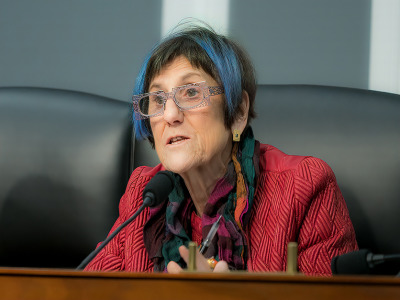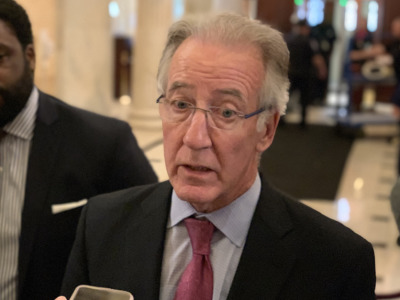House Democrats and their demands to alter the U.S.-Mexico-Canada Agreement are just one set of obstacles to ratification of the trade pact. Influential U.S. unions are becoming more vocal about their own concerns, and Mexico is letting the U.S. know that it’s not prepared to simply accept any changes that are made to the deal that it already signed and approved.
Cathy Feingold, director of the AFL-CIO’s international department, is telling lawmakers and their staff that the country’s largest union is excited about the potential of improving labor conditions in Mexico, Canada and the U.S. through USMCA, but she’s also warning them the labor organization is not ready to support it.
“We want to see measurable progress in many areas before (USMCA) takes effect,” Feingold told an audience on Capitol Hill last week. “Right now, early indications show we’ve not seen the progress or funding to say to Mexico that we trust this can move forward.”
Feingold, along with Benjamin Davis, Director of International Affairs for the United Steelworkers, and Communication Workers of America Director of Legislative Affairs Dan Mauer, were invited by Rep. Bill Pascrell, D-N.J., to brief lawmakers and staff on union demands for USMCA.
The labor officials were adamant that Mexico has not committed enough money in its budget to improve working conditions and wages for Mexican workers and enforce new laws that allow for the creation of private unions.

Rep. Rosa DeLauro, D-Conn. (Photo: Joy Philippi)
“We believe this is a tremendous opportunity right now to build a new trade model,” Feingold said.
That’s why union leaders and House Democrats are stressing that it’s more important to get a good deal on USMCA than ratify it quickly — something the Trump administration and much of the U.S. agriculture sector is pushing for.
“We want to get this right,” said Rep. Rosa DeLauro, D-Conn. “Timing is not the issue. … Working people cannot afford for us to get this wrong. Mexico’s labor reforms sound great on paper, but we need to make sure that they are enforced.”
Even House Speaker Nancy Pelosi, who has repeatedly assured reporters that a deal can be struck with the White House and that she wants the House to vote on USMCA, is now saying that might not happen until 2020.
“We’re on a path to yes, and I think every day brings us closer to agreement,” Pelosi told Bloomberg. “I’d like to have it done as soon as it’s ready. I wouldn’t rule it out next year. Hopefully we can do it sooner, but I said when it’s ready we’ll do it.”
One thing seems clear: House Democrats are giving substantial weight to demands from the unions. AFL-CIO President Richard Trumka was on Capitol Hill last week, and House Ways and Means Committee Chairman Richard Neal proposed that the union take a more active role in the talks between the Democrats and U.S. Trade Representative Robert Lighthizer, the White House’s point man in the negotiations.
“We want labor to come along and help build a template for future agreements,” said Neal, who met with Lighthizer Wednesday. “I do think it would be a good idea if … the AFL-CIO and trade staff here at the House and at USTR would get together during the next 10 or 12 days.”
Rep. John Larson, D-Conn., suggested there might not be a USMCA deal unless Trumka meets directly with Lighthizer and Pelosi.
One potentially controversial proposal supported by the AFL-CIO is an enforcement mechanism that would block exports from any Mexican company that did not adhere to Mexico’s new labor standards.

House Ways and Means Chair Richard Neal, D-Mass.
It’s a proposal that is seriously being considered, Neal told reporters, but Mexico is not certain to agree to it and the foreign inspectors required to check on conditions in Mexican facilities, said Jesús Seade, Mexico’s top North American negotiator.
“We are very willing to find mechanisms … provided it’s all done in a manner that is consistent with our constitution and laws and our sovereignty,” Seade said.
Mexico and Canada will both have veto power over the changes that House Democrats and the White House agree to for USMCA, but the new labor standards and enforcement mechanisms would be primarily aimed at Mexico. That’s why, Seade says, he has been in constant contact with Lighthizer and his staff.
Mexico wants to know exactly what the House Democrats are proposing and what the White House is considering agreeing to because of the potential impact on Mexico’s government, industry sector and workers.
“They have not come to a final resolution of the issues they are discussing,” Seade told reporters Thursday at the Mexican embassy after a two-hour meeting with Lighthizer and a brief private conversation with Pelosi. “At the same time, whatever resolution they come to, it’s in the nature of a proposal for Canada’s and Mexico’s consideration.”
Seade hammered home to reporters that Mexico, which has already ratified USMCA, has a veto in the process.
Getting Mexico to agree to any deals struck between House Democrats and Lighthizer might be easy and take only a few days, Seade said. But it could also be difficult or even impossible. It all depends on the proposed changes to USMCA.
“We cannot just reopen anything that may not be acceptable,” Seade said. “We don’t want to create expectations that everything is going to happen in a few days.”
There is one proposal from House Democrats that Mexico has come around on and now fully supports, Seade said. Panels can be convened under USMCA to consider alleged violations of the pact, but Democrats still say there are too many ways in which a country can block the dispute resolution.
“I think there’s a general sentiment that we should tighten the dispute resolution system in a way that there’s no panel-blocking,” Seade said.
It’s unclear if the Trump and Trudeau administrations will agree, although Neal assured reporters last week that he believes the Canadian Prime Minister approves of Democrats’ reform efforts.
“I believe (the Canadians) are in full accord in terms of support for the enforcement mechanisms that we are insisting on,” Neal said.
More will likely be known this week; Neal arrived in Canada Tuesday night and is expected to meet with Trudeau on Wednesday.
For more news, go to www.Agri-Pulse.com.


